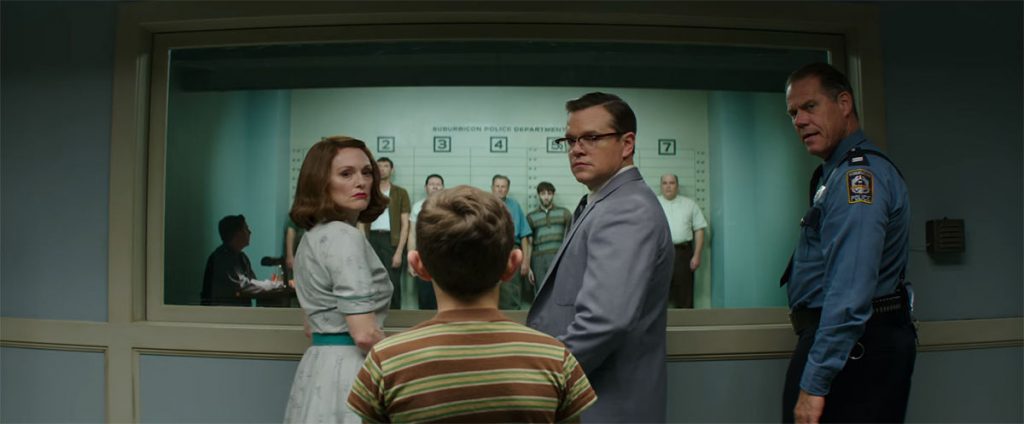The suburbs have long been a source of fascination for Hollywood, providing the perfect setting for slice-of life-stories. Yet many depictions of suburban life underscore the disconnect that the film industry’s harshest critics accuse filmmakers of having, as life in the ‘burbs is portrayed in condescending and at times antiseptic fashion.
The new film “Suburbicon” attempts to put a unique take on suburban life in the late 1950s. Originally written by Joel and Ethan Coen (a.k.a. “The Coen Brothers”) before George Clooney and his writing partner Grant Heslov stepped in, with Clooney also directing, the film mixes extremely dark satire with mysterious thriller elements in an attempt to make a big statement about race relations.
While the Coens, Clooney and Heslove should be commended for their ambition, the wildly varying tones throw the movie far off base and occasionally make it hard to relate to. The result is a movie that has moments of comic brilliance, but is undergirded by a deeply paranoid view of everyday society.
“Suburbicon” opens with a bouncy commercial plugging the charms of a suburban community that has a “diverse” population of residents who are all white but come from all over America. They’ve settled into their small town in the hopes of keeping blacks out, but when the African-American Myers family moves in, the residents are thrown into a comically apoplectic rage at a town meeting.
Meanwhile, a Caucasian boy named Nicky (Noah Jupe) is sent by his mom (Julianne Moore, who also plays the mom’s twin sister Margaret) to befriend the Myers’ young son. That night, Nicky’s father, an angry-looking yet stoic man named Gardner (Matt Damon) wakes him and warns him that two men are in the house and are looking to rob them.
Within moments, the family is tied to chairs while the intruders make angry demands, and are all knocked out with poison. When Nicky wakes up, his mom is dead, something strange is happening between his dad and Margaret, and all hell has broken loose with seemingly unending riots outside the Myers’ house.
There’s a lot going on under the surface, and Nicky has to figure it out quickly. Thus begins a weirdly twisting and definitely twisted take on suburban life and film noir that plays like a demented reinvention of Billy Wilder’s classic “Double Indemnity.”
As director, Clooney is clearly trying to have fun with this highly stylized world and having Damon completely play against type as a sinister father figure who is hiding one secret on top of another. Throughout, “Suburbicon” has trademark moments of the Coen Brothers’ subversive wit, but the very fact that they didn’t choose to direct their script indicates that they likely knew it was impossible to pull it off consistently.
While there are some good laughs to be found scattered throughout, the film is largely too barbed in its exploration of how Nicky navigates the unraveling of his family’s secrets, while not focused enough in how it handles the protests against suburban integration. The riot scenes are frantic yet repetitive, ultimately becoming tiresome and adding little to the mix.
With the Myers family largely remaining shells rather than well-drawn characters, it’s hard to feel genuine sympathy for them or root for their interests. On the other hand, Damon is great in this, but is such an unpleasant character that he’s impossible to like in any way either.
“Suburbicon” is rated R primarily for language and violence, with a fair number of F-words scattered throughout and some uses of God’s name in vain. The violence from the riots and a complex series of murders and cover-ups result in lots of people with bloody clothing, but overall Clooney found some clever ways to get the idea across without ever being too graphic or disturbing.
Overall, this is a movie that Coen brothers aficionados and fans of quirkiness will enjoy, but average moviegoers will be left scratching their heads and wondering what it’s all about.

